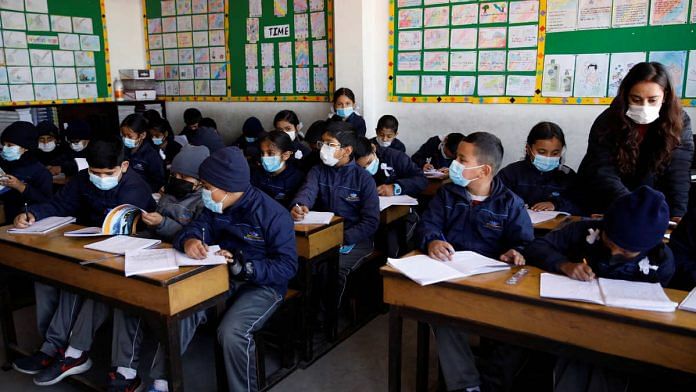Suddenly, every country in the world has to decide whether or not to close schools to slow the Covid-19 pandemic. France will, as of Monday; the U.K. won’t, and so on. Within federal systems like the U.S. and Germany, states or school districts have to make the decision. In Germany, tiny Saarland is shuttering its schools, while other states are holding off. Who’s right and who’s wrong?
The short answer is: It’s complicated. In some cases, it does make sense to close schools. But in the absence of a runaway outbreak, as in northern Italy, there is also a case against closing kindergartens and schools for young children.
There’s certainly no disagreement that the pandemic, which no country can hope to avoid or lock out (that’s what “pandemic” means), must be slowed as much as possible. Even if, theoretically, 100% of the population is destined to become infected eventually, it helps to spread out the caseload. A spike can overwhelm hospitals. This can put doctors with scarce resources in a position of having to triage whom to try to save. With a slow progression, by contrast, more of those with severe symptoms can hope for decent treatment, and lives will be saved.
Nor is there disagreement that the best way to slow the spread of the virus, besides obvious measures like more hand-washing, is to reduce and even eliminate social mixing. No matter the economic cost, no matter the damper on conviviality, many events — from trade fairs to birthday parties and soccer matches, and probably even the Olympics — should be called off. Where possible, people should, for the time being, eat in and work from home.
But schools are different, in several ways. First, the coronavirus, for reasons we don’t yet understand, seems not to make children very sick. So the young are not the primary population needing to be protected for their own sake. But the spread among the young can accelerate the epidemiological math of the overall outbreak. At some point — and this is the logic of the British coronavirus strategy — a majority of children will have been exposed, knowingly or not, and will have built up antibodies to it. And at that point, a so-called herd immunity prevents the virus from spreading further.
Also read: Over 230 Indians evacuated from coronavirus-hit Iran, quarantined in Jaisalmer
An even bigger difference is the knock-on effects from closing schools versus cancelling adult events. If a trade fair is called off, it just doesn’t happen, and the affected adults can self-quarantine at home, unsupervised. If a school or kindergarten is shuttered, the kids don’t miraculously vanish. They must be cared for elsewhere. But where exactly and by whom?
In most cases, at home and by parents, of course. That’s inconvenient but feasible for families with two spouses, where a breadwinner goes to work and the other stays home. Or for those with white-collar jobs that can be done from home on a laptop with good WiFi, provided the kids let it happen.
Not all families are so lucky. What about single parents, the self-employed or those in the gig economy, or anybody in the blue-collar or manufacturing sector? And what about the many parents who are doctors or nurses? Their absence from work could trigger the very breakdown of the medical system policy makers were trying to prevent. It’s important to ask if that’s a risk worth taking for the sake of keeping some children from being infected.
With these scenarios in mind, there’s already talk in some places of exceptions for some children. But administering partial school closures could quickly become a nightmare, and in any case would be self-defeating. Worse, a different sort of arrangement may instead prevail, the oldest one known to humankind. In a struggling family, mom might still go to work to make ends meet, while grandma and grandpa look after the kids at home.
At this point a policy meant to slow an epidemic and prevent systemic breakdown would contribute to causing exactly that. For it’s the grandparents who are most at risk, who end up in intensive care and hospital beds.
A better way to determine when and where to close schools would be to expand testing — in schools and everywhere — to observe and track the virus. By all means, when there’s a spike in a particular school, or town or region, shut the schools down.
But in the meantime why not help all the other schools to do better what they’re already good at? This is looking after, and teaching, kids. Let’s use the stimulus packages being announced to invest in schools and their teachers. Let’s also buy them medical kit and give them new staff trained to prevent contagion. And let’s also enlist the wee ones in a heroic hygiene mission they’ll still be bragging about to their grandchildren. Above all, let’s keep them away from their grandparents. For that — separation — is ironically the way to show solidarity in this pandemic. – Bloomberg
Also read: Don’t forget to dry your hands to prevent COVID-19. Washing isn’t enough



